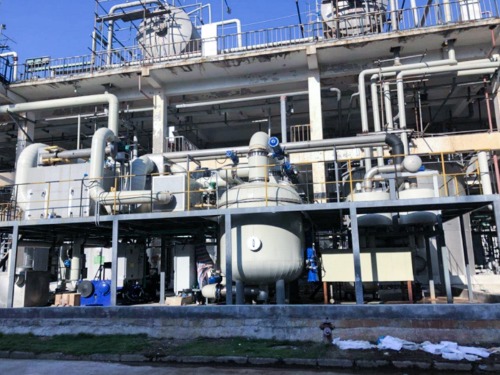The treatment of petrochemicals volatile organic compounds (VOCs) and organic waste gases typically involves various processes aimed at reducing or eliminating the release of harmful pollutants into the environment. The working principle of VOC organic waste gas treatment can be summarized as follows:
Collection and Pre-Treatment:
VOC-containing waste gases are collected from various sources, such as storage tanks, process vents, or exhaust streams.
The collected waste gases may undergo pre-treatment processes such as cooling, condensation, or filtration to remove particulate matter, moisture, and other impurities.
Adsorption:
One common method for VOC removal is adsorption, where the waste gases are passed through an adsorbent material.
The adsorbent, typically activated carbon or other specialized materials, has a high affinity for organic compounds.
VOCs in the gas phase are adsorbed onto the surface of the adsorbent, effectively capturing and removing them from the waste gas stream.
Catalytic Oxidation:
In catalytic oxidation, the waste gases are passed through a catalyst bed, typically containing materials like platinum, palladium, or other metal oxides.
The catalyst promotes the oxidation of VOCs at relatively low temperatures.
When the waste gases come into contact with the catalyst, the VOCs undergo a chemical reaction with oxygen, converting them into carbon dioxide (CO2) and water (H2O).
Thermal Oxidation:
In thermal oxidation, high temperatures are used to thermally decompose and oxidize the VOCs.
The waste gases are heated to elevated temperatures, typically between 800°C and 1200°C.
At these high temperatures, the organic compounds react with oxygen, breaking them down into CO2 and H2O.
Thermal oxidation may require additional fuel for heating, but it can effectively treat a wide range of VOCs and organic waste gases.
Biological Treatment:
In some cases, biological treatment methods such as biofiltration or biotrickling filters are employed.
These systems utilize microbial activity to biodegrade the VOCs present in the waste gases.
The waste gases are passed through a biofilter or biotrickling filter containing a bed of organic material or microorganisms.
The microorganisms metabolize the VOCs, converting them into non-harmful byproducts like CO2, H2O, and microbial biomass.
Monitoring and Control:
Throughout the treatment process, monitoring systems are employed to measure the concentration of VOCs in the waste gas stream.
Various sensors, analyzers, and control mechanisms ensure that the treatment system operates efficiently and meets the required emission standards.
Adjustments to parameters such as temperature, flow rates, and residence time can be made to optimize the treatment process.
By combining these treatment processes, petrochemicals VOC organic waste gases can be effectively treated and their harmful emissions minimized. The specific combination of methods used may vary depending on the characteristics of the waste gases, local regulations, and the desired level of VOC removal.Besides,The treatment of petrochemicals volatile organic compounds (VOCs) and organic waste gases offers several benefits, both for the environment and for the companies involved in petrochemical production. Here are some key benefits of VOC organic waste gas treatment:
Environmental Protection: The primary benefit of VOC organic waste gas treatment is the protection of the environment. VOCs are known to contribute to air pollution and the formation of ground-level ozone (smog), which can have detrimental effects on human health and ecosystems. By treating these waste gases, the release of VOCs into the atmosphere is minimized, reducing air pollution and the potential for associated health and environmental risks.
Compliance with Regulations: Many countries and regions have strict regulations and emission standards in place to control VOC emissions from petrochemical and industrial processes. VOC organic waste gas treatment helps companies comply with these regulations, ensuring that they meet the required emission limits. Compliance not only avoids potential fines and penalties but also demonstrates a commitment to environmental responsibility and sustainable operations.
Improved Air Quality: The reduction of VOC emissions through treatment leads to improved air quality in the surrounding areas. By removing VOCs from waste gases, the potential for the formation of ground-level ozone and other harmful pollutants is reduced. This benefits local communities by providing cleaner and healthier air to breathe.
Resource Recovery: In certain treatment processes, such as catalytic oxidation or thermal oxidation, VOCs are converted into carbon dioxide (CO2) and water (H2O). The resulting CO2 can be captured and potenti ally used for other purposes, such as carbon capture and storage (CCS) or as a feedstock for other industrial processes. This allows for the recovery and utilization of resources, promoting a more circular and sustainable approach to petrochemical production.
Energy Recovery: Some VOC organic waste gas treatment processes, such as thermal oxidation, involve the combustion of VOCs at high temperatures. This combustion releases heat energy that can be captured and utilized for other purposes, such as steam generation or electricity production. Energy recovery from waste gases helps to reduce energy consumption and reliance on external energy sources, contributing to overall energy efficiency.
Positive Public Image: Implementing VOC organic waste gas treatment showcases a company's commitment to environmental stewardship and sustainable practices. It demonstrates a proactive approach to minimizing environmental impacts and protecting local communities. This can enhance a company's reputation, build trust with stakeholders, and attract environmentally conscious customers or investors.
Overall, VOC organic waste gas treatment offers a range of benefits, including environmental protection, regulatory compliance, improved air quality, resource and energy recovery, and a positive public image. These benefits contribute to sustainable operations, reduced environmental impact, and the promotion of a cleaner and healthier environment for all.





 English
English 简体中文
简体中文